新概念英语第一册第71-72课(共15张PPT)
文档属性
| 名称 | 新概念英语第一册第71-72课(共15张PPT) |
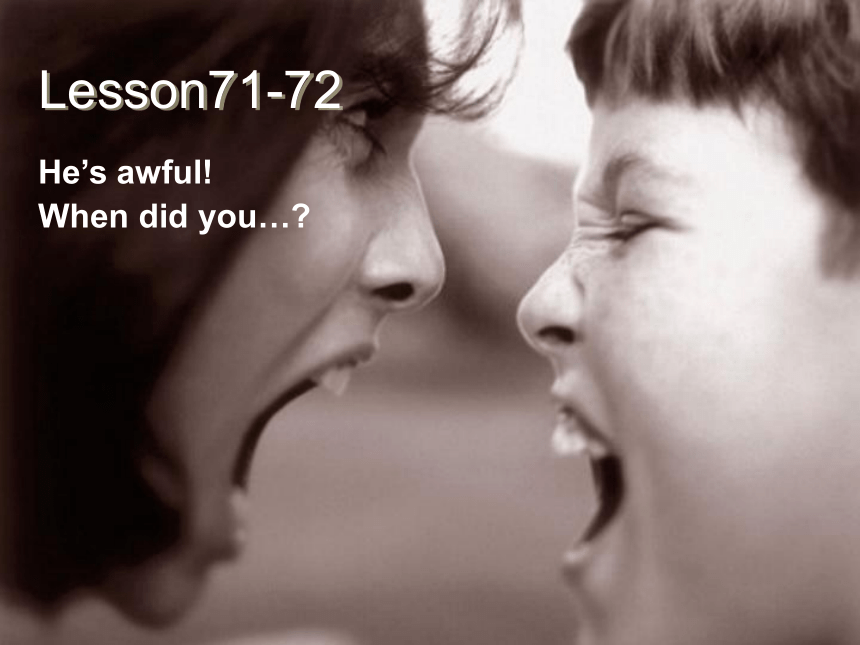
|
|
| 格式 | ppt | ||
| 文件大小 | 605.5KB | ||
| 资源类型 | 教案 | ||
| 版本资源 | 新概念英语 | ||
| 科目 | 英语 | ||
| 更新时间 | 2023-10-06 00:00:00 | ||
图片预览

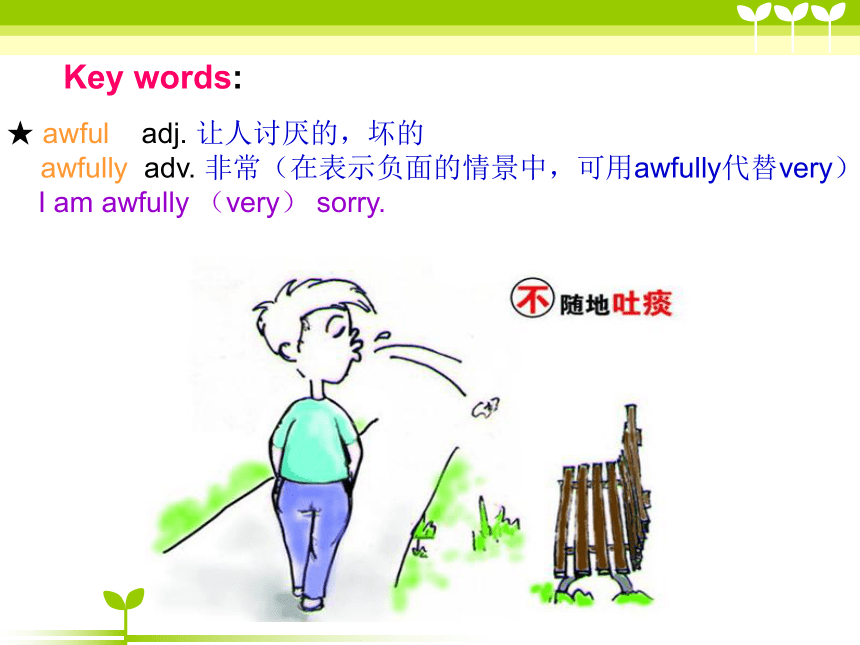
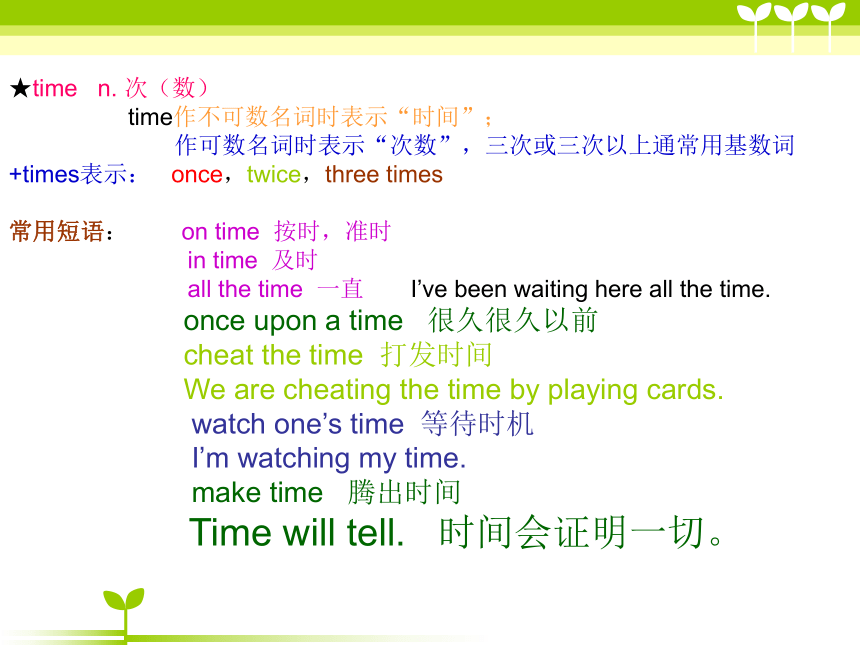
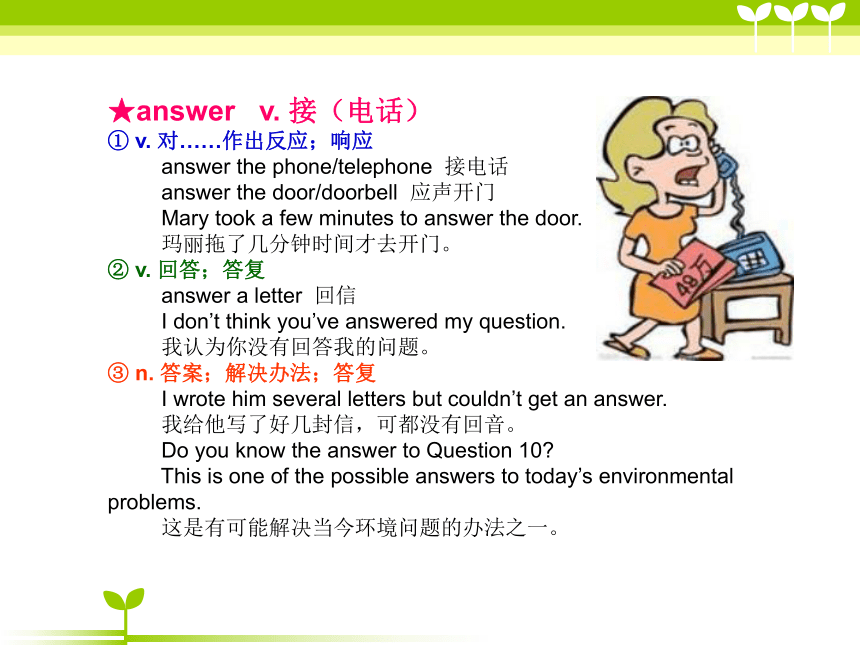

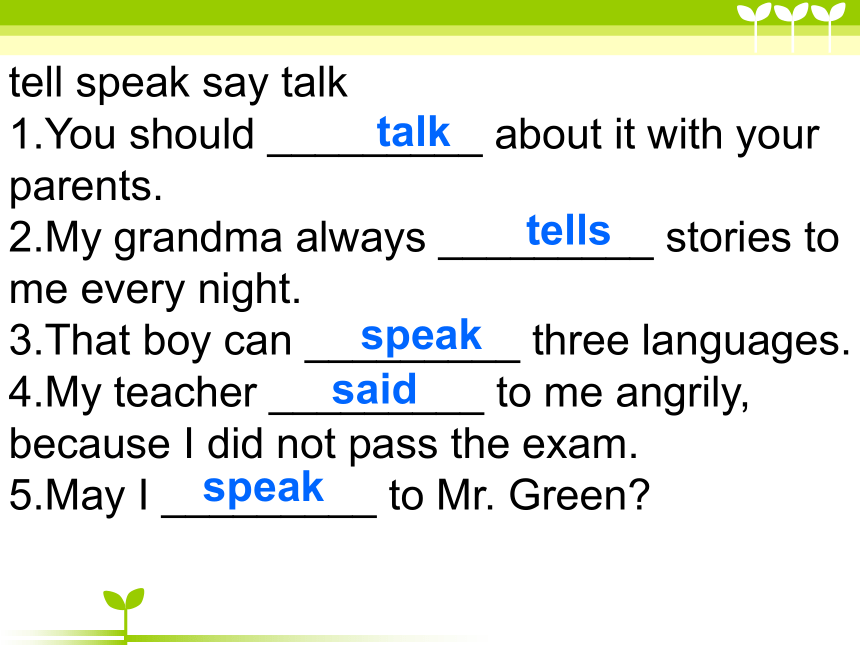
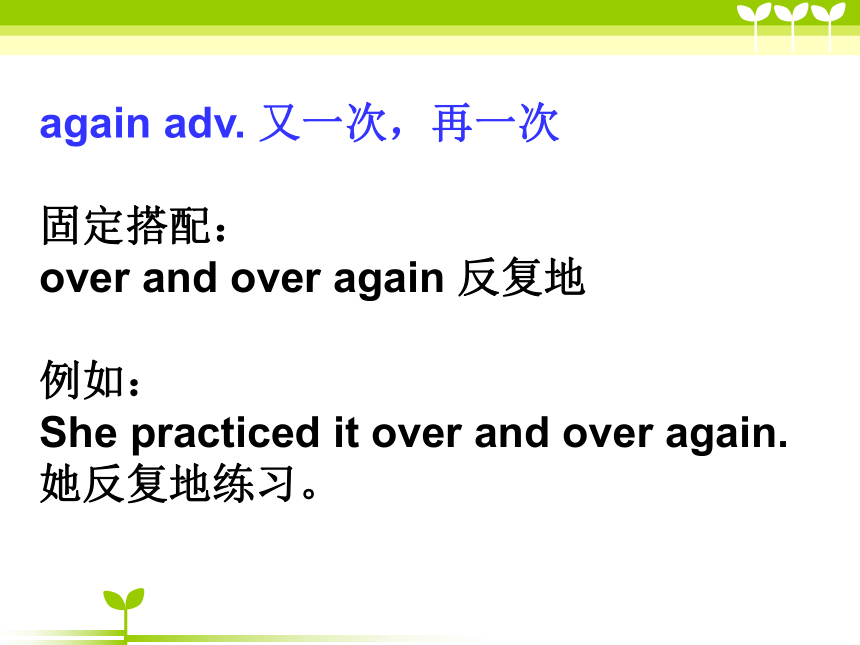
文档简介
(共17张PPT)
Lesson71-72
He’s awful!
When did you…
Key words:
★ awful adj. 让人讨厌的,坏的
awfully adv. 非常(在表示负面的情景中,可用awfully代替very)
I am awfully (very) sorry.
★time n. 次(数)
time作不可数名词时表示“时间”;
作可数名词时表示“次数”,三次或三次以上通常用基数词+times表示: once,twice,three times
常用短语: on time 按时,准时
in time 及时
all the time 一直 I’ve been waiting here all the time.
once upon a time 很久很久以前
cheat the time 打发时间
We are cheating the time by playing cards.
watch one’s time 等待时机
I’m watching my time.
make time 腾出时间
Time will tell. 时间会证明一切。
★answer v. 接(电话)
① v. 对……作出反应;响应
answer the phone/telephone 接电话
answer the door/doorbell 应声开门
Mary took a few minutes to answer the door.
玛丽拖了几分钟时间才去开门。
② v. 回答;答复
answer a letter 回信
I don’t think you’ve answered my question.
我认为你没有回答我的问题。
③ n. 答案;解决办法;答复
I wrote him several letters but couldn’t get an answer.
我给他写了好几封信,可都没有回音。
Do you know the answer to Question 10
This is one of the possible answers to today’s environmental problems.
这是有可能解决当今环境问题的办法之一。
talk,say,speak,tell 的区别:
talk 指“谈论”的意思,既可以作名词也可以作动词,作动词时后面要接about,with 或to 构成短语来使用。
例如:What are you talking about 你们正在谈论什么?
say 指说的具体内容,后面可接to sb.,指对某人说。
例如:Please say it again. 请把它再说一遍。
“Go out!” she said to me angrily. “滚出去!”她生气地对我说。
speak 指说某种语言,后面可以接to sb.,指和某人说话
例如:I can speak Japanese. 我会说日语。
May I speak to Mr. Black 我可以和Black 先生说话吗?
tell 主要指告诉,短语:tell sb. sth. = tell sth. to sb. 告诉某人某事
tell sb. about sth. 告诉某人关于某事
例如:Please don’t tell it to your parents.
请不要把这件事告诉给你的父母。
tell speak say talk
1.You should _________ about it with your parents.
2.My grandma always _________ stories to me every night.
3.That boy can _________ three languages.
4.My teacher _________ to me angrily, because I did not pass the exam.
5.May I _________ to Mr. Green
talk
tells
speak
speak
said
again adv. 又一次,再一次
固定搭配:
over and over again 反复地
例如:
She practiced it over and over again. 她反复地练习。
Key structures:
1、What's Ron Marston like, Pauline
What is sb. like 询问某人的外貌或品行。
What's your father like
What’s … like 什么怎么样?
What's the climate like in your country
What's the weather like in spring
2、speak to sb. 与某人说话
May I speak to Pauline, please
I’d like to speak to Pauline, please.
在电话中回答:This is….
3、pretend as 假装
She pretended herself as her mother.
一般过去时Ⅰ
语 法 回 顾 Ⅰ
概念:表示过去某一时间发生的动作或存在的状态,通常以动词的过去式表示,其否定句和各种疑问句靠助动词did构成。
一般过去时
构成:(过去时间存在的状态)
be 的过去式是was 和were,
was 用于第一人称和第三人称单数,
were用于其他人称,
如:We were there at four o’clock.(P140)
Were you at the butcher’s.(P133)
I was at home on Saturday.(P136)
1.) 肯定句:主语+过去式+其它
如:He telephoned me four times yesterday.
2.) 否定句:主语+didn’t+动词原形+其它
如: He didn’t telephone me four times yesterday.
一般过去过的几种基本句型
4.) 特殊疑问句:特殊疑问词+ did +主语+动
词原形+其它?句末用问号。
如:When did he telephone you four times
He telephoned me four times yesterday
3.) 一般疑问句及其回答:
Did +主语+动词原形+其它?句末用问号。
肯定回答:yes, …did.
否定回答:No, …didn’t.
如:Did he telephone you four times yesterday
Yes, he did . / No, he didn’t.
一般过去过的几种基本句型
常用时间状语:引导的含过去时的句子
YESTERDAY
TODAY
THE DAY BEFORE YESTERDAY
This morning
This afternoon
This evening
tonight
一般过去时
一般现在时
一般过去时
yesterday morning
yesterday afternoon
yesterday evening
last night
the day before yesterday in the morning
the day before yesterday in the afternoon
the day before yesterday in the evening
the night before last
Lesson71-72
He’s awful!
When did you…
Key words:
★ awful adj. 让人讨厌的,坏的
awfully adv. 非常(在表示负面的情景中,可用awfully代替very)
I am awfully (very) sorry.
★time n. 次(数)
time作不可数名词时表示“时间”;
作可数名词时表示“次数”,三次或三次以上通常用基数词+times表示: once,twice,three times
常用短语: on time 按时,准时
in time 及时
all the time 一直 I’ve been waiting here all the time.
once upon a time 很久很久以前
cheat the time 打发时间
We are cheating the time by playing cards.
watch one’s time 等待时机
I’m watching my time.
make time 腾出时间
Time will tell. 时间会证明一切。
★answer v. 接(电话)
① v. 对……作出反应;响应
answer the phone/telephone 接电话
answer the door/doorbell 应声开门
Mary took a few minutes to answer the door.
玛丽拖了几分钟时间才去开门。
② v. 回答;答复
answer a letter 回信
I don’t think you’ve answered my question.
我认为你没有回答我的问题。
③ n. 答案;解决办法;答复
I wrote him several letters but couldn’t get an answer.
我给他写了好几封信,可都没有回音。
Do you know the answer to Question 10
This is one of the possible answers to today’s environmental problems.
这是有可能解决当今环境问题的办法之一。
talk,say,speak,tell 的区别:
talk 指“谈论”的意思,既可以作名词也可以作动词,作动词时后面要接about,with 或to 构成短语来使用。
例如:What are you talking about 你们正在谈论什么?
say 指说的具体内容,后面可接to sb.,指对某人说。
例如:Please say it again. 请把它再说一遍。
“Go out!” she said to me angrily. “滚出去!”她生气地对我说。
speak 指说某种语言,后面可以接to sb.,指和某人说话
例如:I can speak Japanese. 我会说日语。
May I speak to Mr. Black 我可以和Black 先生说话吗?
tell 主要指告诉,短语:tell sb. sth. = tell sth. to sb. 告诉某人某事
tell sb. about sth. 告诉某人关于某事
例如:Please don’t tell it to your parents.
请不要把这件事告诉给你的父母。
tell speak say talk
1.You should _________ about it with your parents.
2.My grandma always _________ stories to me every night.
3.That boy can _________ three languages.
4.My teacher _________ to me angrily, because I did not pass the exam.
5.May I _________ to Mr. Green
talk
tells
speak
speak
said
again adv. 又一次,再一次
固定搭配:
over and over again 反复地
例如:
She practiced it over and over again. 她反复地练习。
Key structures:
1、What's Ron Marston like, Pauline
What is sb. like 询问某人的外貌或品行。
What's your father like
What’s … like 什么怎么样?
What's the climate like in your country
What's the weather like in spring
2、speak to sb. 与某人说话
May I speak to Pauline, please
I’d like to speak to Pauline, please.
在电话中回答:This is….
3、pretend as 假装
She pretended herself as her mother.
一般过去时Ⅰ
语 法 回 顾 Ⅰ
概念:表示过去某一时间发生的动作或存在的状态,通常以动词的过去式表示,其否定句和各种疑问句靠助动词did构成。
一般过去时
构成:(过去时间存在的状态)
be 的过去式是was 和were,
was 用于第一人称和第三人称单数,
were用于其他人称,
如:We were there at four o’clock.(P140)
Were you at the butcher’s.(P133)
I was at home on Saturday.(P136)
1.) 肯定句:主语+过去式+其它
如:He telephoned me four times yesterday.
2.) 否定句:主语+didn’t+动词原形+其它
如: He didn’t telephone me four times yesterday.
一般过去过的几种基本句型
4.) 特殊疑问句:特殊疑问词+ did +主语+动
词原形+其它?句末用问号。
如:When did he telephone you four times
He telephoned me four times yesterday
3.) 一般疑问句及其回答:
Did +主语+动词原形+其它?句末用问号。
肯定回答:yes, …did.
否定回答:No, …didn’t.
如:Did he telephone you four times yesterday
Yes, he did . / No, he didn’t.
一般过去过的几种基本句型
常用时间状语:引导的含过去时的句子
YESTERDAY
TODAY
THE DAY BEFORE YESTERDAY
This morning
This afternoon
This evening
tonight
一般过去时
一般现在时
一般过去时
yesterday morning
yesterday afternoon
yesterday evening
last night
the day before yesterday in the morning
the day before yesterday in the afternoon
the day before yesterday in the evening
the night before last
同课章节目录
